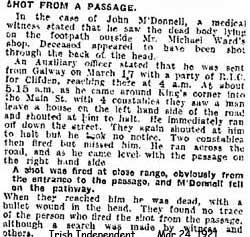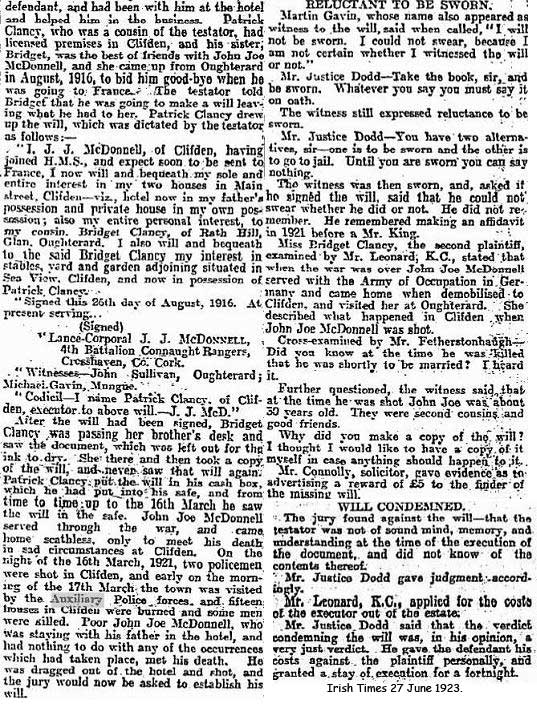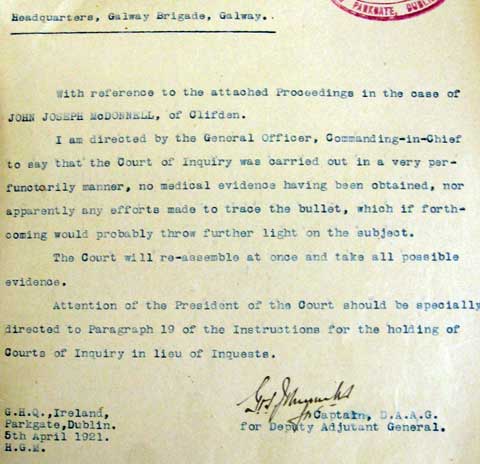

1890 Born Co Galway
1901 census with his grandfather and father at Market Hill, Clifden

1911 census with his father Main St, Clifden

1915 joined Connaught Rangers. His service number if 6372, points to Jan 1915. I cannot be sure of his MIC, but it appears to be this man

1916 Aug. Went to France end/Aug or early Sept - his will was dated 26 Aug in Clifden. Served in Salonika, His father said he received money from his son sent from there. The 4th Battalion was an extra reserve battalion which did not serve overseas, the only Connaught rangers in Salonica were 5th Battalion - 30 September 1915 : moved via Mudros to Salonika. September 1917 : moved to Egypt for service in Palestine. 30 April 1918 : left the Division and sailed from Port Said, arriving Marseilles 1 June. 23 July 1918 : came briefly under command of 14th (Light) Division. 22 July 1918 : placed under command of 197th Brigade in 66th (2nd East Lancashire) Division.
1919 Mar 1. John J McDonnell Connaught Rangers, Royal Irish Regiment 6372, 40463 is included in the draft that went from Connaught Rangers to Royal Irish Regt. The men were transferred compulsorily and permanently and posted to the 7th Battalion Royal Irish. They then all seem to have been transferred to Class Z Reserve 29 Sept 1919
1921 Mar 16. The IRA in Galway attacked the RIC barracks in Clifden. Two RIC constables were killed. The IRA column retreated to the Maam valley, where they ambushed British reinforcements at Munterowan and Screebe. The Crown Forces burned 16 buildings in Clifden in reprisal for the attacks.


John Joe McDonnell lost his life during the reprisal burnings. The only thing that both sides agree on is that he was shot by Crown forces

Grainy newspaper photo of McDonnell's Hotel after burning and the hotel today
1921 Mar He was buried at Ardbear Cemetery
1921 Apr 7. Questions are asked in Westminster
Lieut.-Commander KENWORTHY asked the Chief Secretary whether, following the assassination of two police-constables at Clifden, in Connemara, on 16th March last, nine houses, including the house of the father of ex-Sergeant-major McDonnell, were burnt by the Crown forces; whether ex-Sergeant-major McDonnell was shot while trying to extinguish the flames in his father's house; whether this was an official or unofficial reprisal; and whether Connemara is in the martial-law area?
Mr. HENRY The facts of the case are as follow. At 10 p.m. on 16th March two policemen, Constable Reynolds and Constable Sweeney, on patrol with others at Clifden were shot down in cold blood at point-blank range by a party of civilians, some of whom were masked. Reynolds, who had been living with his wife and young family in Clifden for some years and bore an excellent character, was instantly killed. Sweeney, who was also an Irishman and had served with distinction in the Irish Guards, was severely wounded in three places and did not survive 48 hours. News of this abominable outrage was conveyed to Galway 50 miles away by wireless, the telegraph wires having been cut. A party of Royal Irish Constabulary under three experienced officers was at once dispatched by special train to the scene of the outrage in the hope of apprehending the murderers. This party, which included men who knew the locality well, arrived in Clifden between 3 a.m. and 4 a.m. on the morning of the 17th. As they approached certain houses which they intended to search fire was immediately opened from the houses on them. In the course of the encounter which ensued, twelve houses were burned and four others damaged. A man named John McDonnell, who escaped from one of the houses, was shot dead after running some distance. Another man named Peter Clancy, pensioner from the Royal Irish Constabulary, was wounded by a stray bullet. The statement that McDonnell was shot while endeavouring to extinguish the flames is untrue. As will be clear from what I have said this was not a case of reprisal. The district is not in the martial-law area.
1921 The military inquiry was told that "death was due to shock following bullet wounds to the head" . A police sergeant in charge of 6 RIC men was in the narrow lane near Higgins' house. He heard shouts of "Halt", a civilian ran past, they fired and he fell. McDonnell was fully dressed and wearing a cap
In fact there were at least 2 Military Inquires and Dublin was not happy. The first inquiry found


1923 Jun 17. An odd legal case unfolded, in which his cousin claimed that he had willed her all his money, but that the will have been destroyed by the British in a raid.. The court did not believe her, and the money went to his father.


1924 Jul 15. The compensation case has still not been settled according to questions asked in Dáil Éireann -
TOMAS O CONAILL asked the Minister for Finance whether compensation has yet been paid to Mr. Alex. McDonnell, of Clifden, Co. Galway, on account of his premises, “McDonnell's Hotel,” which were burned down by British Forces on March 17th, 1921, as well as for furniture and personal effects destroyed on the same occasion; further, whether he will say if any decision has been taken in the matter of Mr. McDonnell's claim for compensation for the loss of his only son, John Joe McDonnell, who was killed by British Forces during the Anglo-Irish struggle.
The PRESIDENT: The claim of the person named by the Deputy for compensation in respect of damage to property has not yet been the subject of an award by the Compensation (Ireland) Commission. It is understood, however, that the case is at present under consideration by that tribunal. Mr. McDonnell's application for compensation in respect of the death of his son will be listed for hearing by the Compensation (Personal Injuries) Committee during the course of their next sittings at Galway.
It is believed that Alex McDonnell was awarded £6,000.00 for the loss of the hotel .




